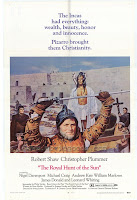The Royal Hunt of the Sun
 The Royal Hunt of the Sun is adapted from a play by Peter Shaffer (who also wrote Equus and Amadeus), first produced in 1964, and its theatrical origins remain evident even in the cinematic adaptation. For all the potentially epic scope of its theme, Francisco Pizarro's expedition to Peru and the conquest of the Inca Empire, the film's action is mainly confined indoors and the atmosphere is closed and even claustrophobic.
The Royal Hunt of the Sun is adapted from a play by Peter Shaffer (who also wrote Equus and Amadeus), first produced in 1964, and its theatrical origins remain evident even in the cinematic adaptation. For all the potentially epic scope of its theme, Francisco Pizarro's expedition to Peru and the conquest of the Inca Empire, the film's action is mainly confined indoors and the atmosphere is closed and even claustrophobic.The movie's focus is very much on Pizarro, but not Pizarro the warrior, despite the fact that we're repeatedly reminded that he is above all a man of war: illiterate, of peasant stock, unskilled in statecraft. The question posed is what happens when such a man comes face to face with a king: first the King of Spain, and then the Lord Inca Atahualpa who, what is more, is regarded as a living God, son of the Sun itself.
In the first encounter, with King Carlos, Pizarro boldly and brashly presses his suit by criticizing the men who throng the court for the fact that they do nothing, that they don't even dream, let along act.
 But face to face with the Inca, and in part precisely because of his distance from the Spanish aristocracy and its raison d'etat, Pizarro is increasingly seduced by Atahualpa's dignity and disconcerting self-confidence. He sees an echo of himself in the Lord Inca, not least because both are bastards. But as another character comments, "It seems they have more in common than their lowly birth." Both are illiterate, for instance, and so in thrall to but also somewhat disparaging of the culture of the book. Neither have much time for the Catholic church, and its insistence on a divinity that nobody can see, on a faith that can call on precious few concrete signs. And each therefore prefers to trust a man's character rather than a society's ideology.
But face to face with the Inca, and in part precisely because of his distance from the Spanish aristocracy and its raison d'etat, Pizarro is increasingly seduced by Atahualpa's dignity and disconcerting self-confidence. He sees an echo of himself in the Lord Inca, not least because both are bastards. But as another character comments, "It seems they have more in common than their lowly birth." Both are illiterate, for instance, and so in thrall to but also somewhat disparaging of the culture of the book. Neither have much time for the Catholic church, and its insistence on a divinity that nobody can see, on a faith that can call on precious few concrete signs. And each therefore prefers to trust a man's character rather than a society's ideology.And so whereas the Spaniard's advisors, representing both church and state, along with the rabble he leads, are all clamoring for the indigenous leader's head, Pizarro would rather honor the contract he has made with Atahualpa: that once he has provided the Spaniards with their roomful of gold, he should be set free and return to his people. And when the Spanish general has to give in to his men's desires, he insists that the Inca convert to Christianity above all so that he should be strangled rather than burnt, that his body remain intact for a future resurrection. Pizarro is then portrayed as more disappointed than anyone when Atahualpa remains resolutely dead, when the God he thought he might have hunted turns out to be human just like himself.
 The character of the Inca is never really fleshed out: Christopher Plummer (who had played Pizarro in the Broadway production) portrays him as a sort of idiot savant, one third Gollum, one third spoiled child, one third mystic, with the strangest of accents that sounds half German, half Mexican, not to mention a bizarre repertoire of hisses, squeals, squeaks, and grunts.
The character of the Inca is never really fleshed out: Christopher Plummer (who had played Pizarro in the Broadway production) portrays him as a sort of idiot savant, one third Gollum, one third spoiled child, one third mystic, with the strangest of accents that sounds half German, half Mexican, not to mention a bizarre repertoire of hisses, squeals, squeaks, and grunts.And Pizarro becomes perhaps the archetypal 1960s figure: a man who has lost faith in his own society but is looking, more in hope than in expectation, for some kind of redemption from another. He is a military man who no longer trusts the cause for which he allegedly fights. The parallels with Vietnam, when the film was made in 1969, are obvious enough. And in the play's recent revival at the National Theatre, as The Independent's review notes, the parallels with Iraq are clear, albeit left implicit.
Shaffer gives us a post-ideological world, although interestingly he does so by suggesting that there never was any ideology in the first place. Neither Pizarro nor the men of state really believe in the civilizing mission; the only difference is that Pizarro is prepared to say so, while the others hide behind ideology as ruse of imperial reason. The only believer in all this is the young page Martin. And in the play the whole story is narrated by the same Martin, now older and wiser. By contrast the film perhaps still holds out the hope that Martin will retain some of his idealism, even as he sees Pizarro's desperate will to believe cruelly negated by Spaniard and Inca alike.
YouTube link: the Inca's arrival at Cajamarca.
